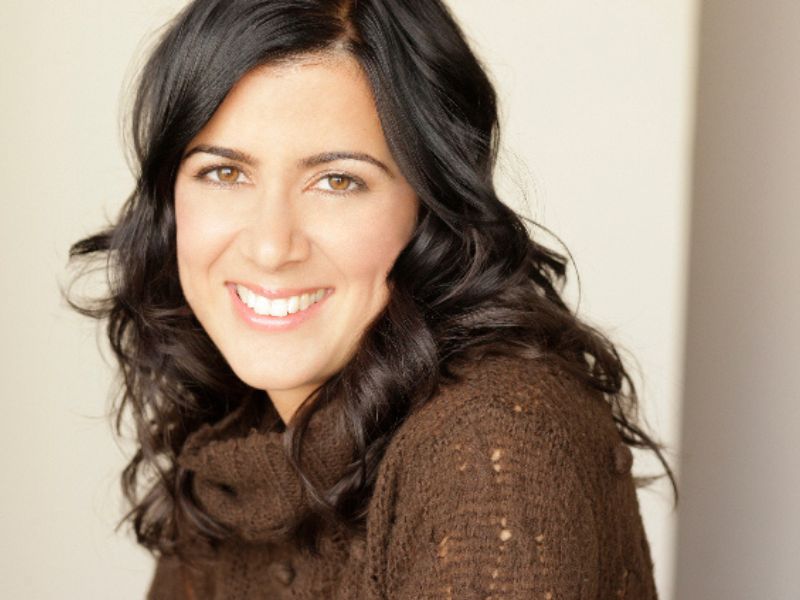Iris Bahr wants to give people “a license to laugh.”
That’s one of the things the acclaimed Israeli-American comedian hopes to achieve in See You Tomorrow, her newest one-woman show, opening next week in a world premiere at Theater J.
But laughter does not come easily today, when audiences — in DC and around the world — are still reeling from the horror of October 7. That’s when 1,400 Israelis, most of them citizens, were massacred, and 250 people, infants and elders among them, were taken hostage.

However, Bahr, who now lives in Tel Aviv, hopes that her tale — ”a universal story of love, loss and grief” — will strengthen the belief, on the part of American Jews, in the importance of having a Jewish homeland in Israel.
“My most fervent wish,” she said, “is that Theater J’s audiences, seeing this play, will be able to forge a new level of connection to Israeli society and to the importance of its existence.”
See You Tomorrow, Bahr’s fifth stage production, is a tragic story laced with humor. And while it is similar to some of her previous work — in that she portrays all the characters, moving deftly from pompous to puerile, silly to sad — this one is different.
“It’s frankly autobiographical,” she told me as we chatted over a video connection. She had just arrived from her home in Israel and was staying at a friend’s apartment in New York. From the window, opposite the UN, she could see the protests, raging against the Middle East war, below.
The play is based on the true story of what happened two years ago, when Bahr and her mother were on a daily video call, she in Hollywood, her mother in Tel Aviv.
“Suddenly, while we were chatting, my mother had a stroke,” Bahr said, her face onscreen registering the shock of the moment. “It was horrible. I flew to Israel immediately, and then settled in Tel Aviv to look after her.”
The stroke, as often happens, resulted in dementia. “My mom is now in a memory-care facility in Tel Aviv,” she said. The two talk twice a day on the phone and visit often. “I spend more time caregiving than performing,” she added.
Despite the sad subject matter, there’s a lot of humor in the show. That, according to Bahr, is because humor is how she copes with all the major challenges in life.
It’s also, she told me, because she believes that art should be entertaining.
“See You Tomorrow is a lot more than a monologue. It’s a long-form story. There are about a dozen separate roles — my mom, her best friend, the best friend’s husband, various doctors and social workers, other patients — and I play them all.

“Many of the roles are comic,” she added. “There’s the head doctor in stroke rehab who has a comb-over that transcends the laws of physics. And there’s the guy I went on a date with who wouldn’t stop talking about his psoriasis.”
The play also provides a window into an aspect of Israeli society — and in particular its healthcare system — that she got to know on an intimate basis.
“I was struck by the extent to which the staff at the rehab hospital worked together in a way that transcended politics and socioeconomic boundaries,” she said. “For example, all the nurses in the ward were Palestinian men — Arab Israeli citizens — who worked in perfect harmony with the Russian, Eritrean, and Israeli staff.”
In workshop productions — held in New York, LA, and Tel Aviv — the play clearly resonated with audiences. “It’s a universal story,” Bahr said, pointing out that it’s tough and sad, but funny. The laughter is meant to be cathartic.
Interestingly, the script, like a lot of the stand-up on which it’s modeled, is not set in stone. It changes, depending on the audience. “It’s also very short — less than 50 minutes — which leaves more time for after-show discussions.”
Bahr, who was born in the U.S., spent her childhood in a leafy part of the Bronx, just north of Manhattan. With her mother, she emigrated to Israel at the age of 13. After serving in the Israeli army, she returned to the U.S., where she graduated from Brown University (magna cum laude, no less, with a major in neuroscience) and began her career as an actor.
“I did brain research on the side,” she quipped, citing the influence of another neuroscientist, Mayim Bialik, who parlayed her science degree into a TV career in which comedy, acting, and writing were merged into the unlikely role of game show host.
Fast forward some 20-odd years. Today, Bahr is the author and/or star of five plays, three books, hundreds of television episodes (she’s a recurring character on Curb Your Enthusiasm), and dozens of full-length films, podcasts, and yes, even voiceovers on video games.

“No, I’m not an overachiever, “ Bahr laughed when I expressed amazement at the length of her bio. “I just pursue whatever interests me. My parents’ generation saw focusing on more than one subject as irresponsible. They thought you became a doctor or a lawyer or whatever, but you focused on one profession. Delving into both the arts and science, as I did, seemed frivolous.
“My generation, on the other hand, tends to be multi-disciplinary. I think science has become much more accessible in general. Nowadays, everything is bite-sized,” she said, adding that some people actually use the term “snackable entertainment.”
That’s both good and bad, she sighed: “Bad because it dilutes the material, but good because almost anyone can learn anything.”
See You Tomorrow is particularly timely today in its depiction of the agony of families in the U.S. — or elsewhere in the Diaspora — who are separated by distance and culture from each other.
Reflecting on the crisis in Israel today, Bahr prefaced her remarks by pointing out that there are many public figures who have spoken more eloquently on the subject.
“I can only speak about my own feelings and thoughts,” she admitted. “But what’s happening today is tragic. It’s tragedy on tragedy on tragedy. Israeli suffering, Gazan suffering, it’s all terrible.”
Speaking of the pain on the Israeli side — to which she can personally attest — there are many levels beyond the loss and profound grief it engenders.
“Most painful,” she continued, “is the hate, the sheer hate, that’s emerged. It’s the antisemitism that’s always been there, but is now disturbingly out in the open. And it comes from the most unlikely places and people. It’s expressed in silence, in ignorance, and even — and this is the most horrific form it can take — in the celebration of the slaughter that occurred on October 7.
“Worst of all, both the massacre and the taking of hostages — many of them elderly and children — have disappeared from the public consciousness.
“Whether that dismissal is intentional — or simply the result of an inability to fathom the simultaneous suffering of two separate groups of people — is irrelevant. How can you not feel the pain of those whose families have been kidnapped? Where is the global outcry?” she asked.
She’s only glad that her mother, the inspiration for See You Tomorrow, doesn’t know this is happening.
Bahr describes herself as an extreme empath (a person deeply attuned to the feelings of others). Because of that, she can see from multiple perspectives.
“I feel the pain of both my people and the people of Gaza, and it’s overwhelming. The ones whose family members — parents, siblings, and children — were so brutally murdered. The families of the hostages, with no idea of their fate. The sons and daughters of my friends, now serving. None of them wanted this war,” she concluded.
In an effort to bring the horror home to Americans, Bahr is currently putting together a live performance in New York that will reflect the horror unfolding.
It’s a concert-like piece, involving a choir and volunteers performing a soundscape of music intermingled with the names of the hostages. (She will let DCTA know when a date and location have been announced.)
Coming up, once she returns to Tel Aviv, are a new episode of Curb Your Enthusiasm with Larry David; a TV series starring Carol Kane, called Dinner with the Parents (on Amazon Freevee, a free video streaming service); a TV pilot made in Ireland, for which she won a Best Actress Award (they gave her a big trophy); and The Near-Death Podcast (for Apple).
See You Tomorrow plays from November 14 through November 22, 2023, at Theater J at the Aaron & Cecile Goldman Theater in the Edlavitch DC Jewish Community Center, 1529 16th Street NW, Washington, DC. Purchase tickets ($50–$70, with member and military discounts available) online or by calling the ticket office at 202-777-3210.
Running Time: Approximately 50 minutes with no intermission.
See You Tomorrow is the first in Theater J’s Here I Am series of three one-person plays focusing on identity and the relationship between the individual and the family. The next two plays are Michelle Lowe’s world premiere of Moses in December and Sun Mee Chomet’s East Coast premiere of How to Be a Korean Woman in January.
COVID Safety: Masks are required for Thursday evening and Saturday matinee performances. For more information, visit Theater J’s COVID Safety Guidelines.
See You Tomorrow
Written, Directed, and Performed by Iris Bahr
Set Design: Nephelie Andonyadis
Lighting Design: Jesse W. Belsky
Production Stage Manager: Becky Reed
Assistant Stage Manager: Margaret Warner




